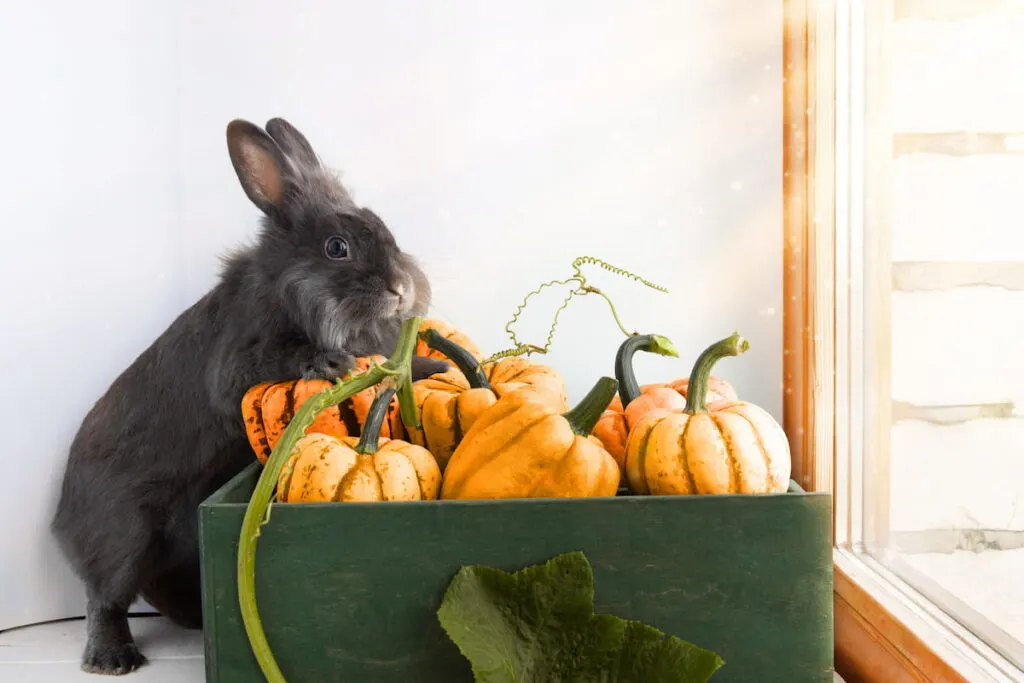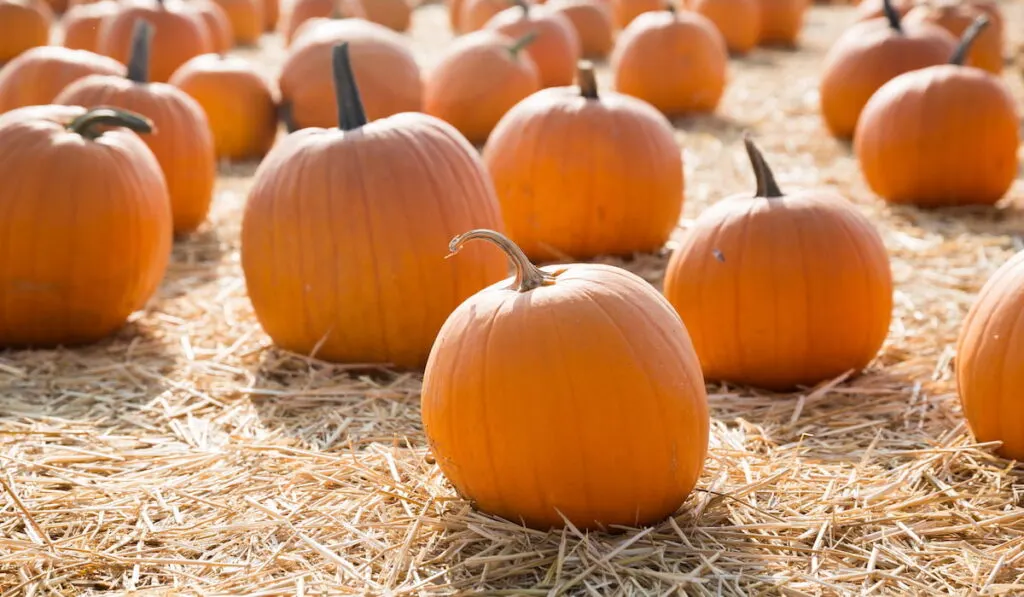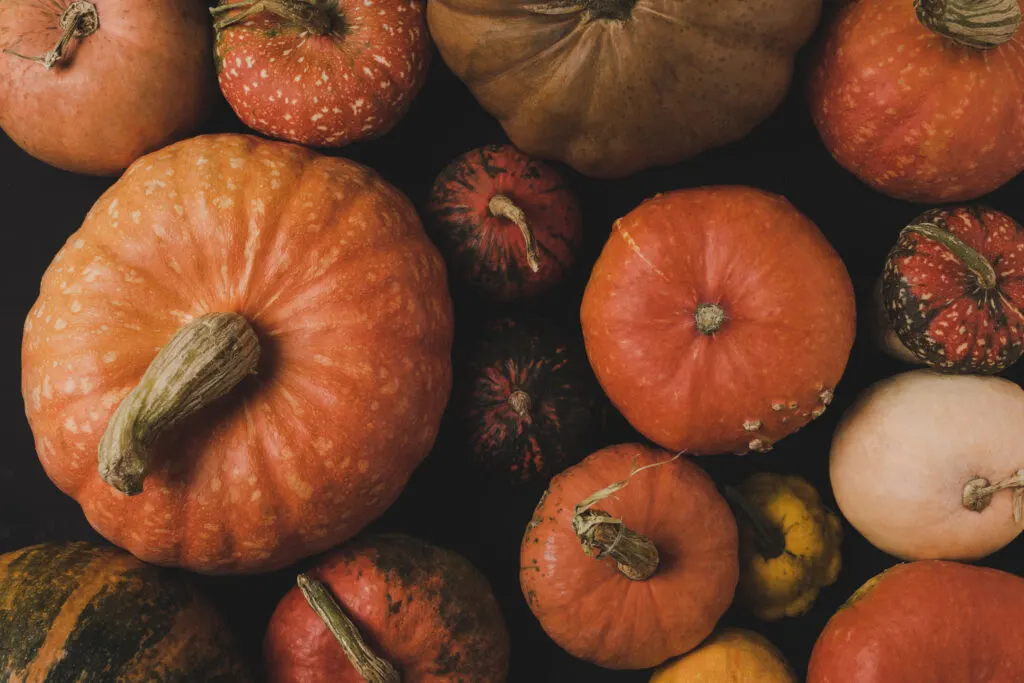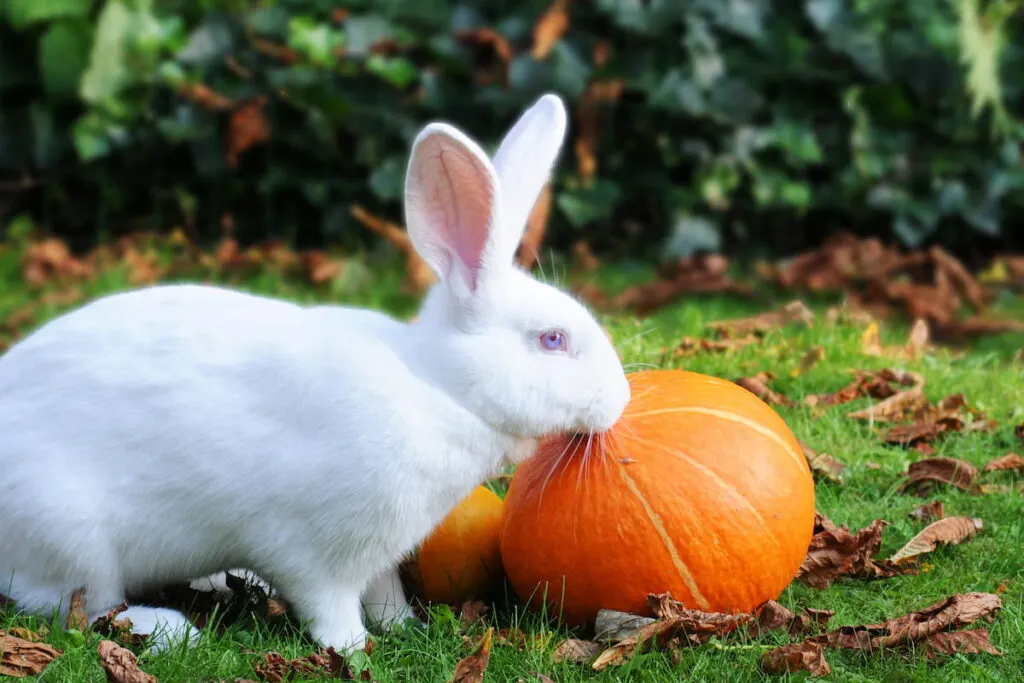The little furry creatures called rabbits have a plant-based diet. In other words, they are herbivores. So, they’ll only eat things like grasses, seeds, and fruits. Rabbits love to eat plants like beets, spinach, broccoli, beans, and carrots. But what about pumpkins?
Can a rabbit eat pumpkin? Yes, they can eat pumpkin.
Rabbits can eat the flesh and the skin/rind of pumpkins. One important thing to consider while feeding them is the quantity. It is safer to feed rabbits pumpkin in moderation. However, the amount you feed them depends on how big they are.

What else should you know before you feed pumpkin to your rabbit? We’ve got the details, so read on.
Table of Contents
Can Rabbits Eat Pumpkin?
As mentioned in the introduction, rabbits can eat pumpkin, especially the flesh and the rind. While they can eat both these parts of a pumpkin, it turns out the rind might be healthier.
You should be a little cautious while giving your rabbit pumpkin for the first time. As with other vegetables, too much pumpkin can be unhealthy for them.
Pumpkins contain high levels of fiber, starch, and sugar. Giving rabbits too much at once can upset the balance of their gastrointestinal flora. This can turn out harmful to them.
Rabbits have sensitive stomachs; they cannot vomit. So, even if they consume too much pumpkin, it remains in them and can make them uncomfortable.
Now let’s see how rabbits handle the different parts of a pumpkin.
Seeds
Rabbits can consume pepitas safely (pumpkin seeds are called pepitas). But you should avoid giving them as a mainstay.
Pumpkin seeds pack many beneficial nutrients such as zinc, iron, copper, potassium, manganese, vitamin A, and vitamin B-complex.
Pepitas are only suitable as treats given to rabbits once in a while. The seeds contain a lot of fat, and this is one reason why they should only be eaten once in a while.
Remember, we mentioned that rabbits have sensitive stomachs? Well, fat is one of those substances that can upset their stomachs.

Rabbits cannot digest fat efficiently. So, if you give them pumpkin seeds routinely, things will not go well. Fat will reduce the movement of the gastrointestinal tract and the rate of digestion of rabbits.
Fat can cause other health issues including, obesity and fatty liver. Another undesirable possibility that comes with feeding pumpkin seeds to rabbits is choking.
While the rabbits eat the pumpkin seeds, pay extra attention to ensure that they do not choke on the seeds. Alternatively, you may grind the seeds and give them a pinch on their food. This way, there is very little risk of choking.
Leaves
Pumpkin leaves contain calcium, vitamin A, vitamin B2, vitamin K, vitamin E, and magnesium. Rabbits can take small bites of these leaves, but it is not the best for them.
Normally rabbits will absorb the calcium contained in pumpkin leaves. But if they eat too much, calcium might accumulate in their bladder and affect urine production.
Besides affecting urine production, it may also cause issues in the bladder, kidney, urethra, and ureter.
Flowers
Rabbits can consume the flowers from a pumpkin safely. But this has to be in small portions. Before letting your rabbit nibble away on pumpkin flowers, ensure that it is free of any type of chemical.
Skins
Pumpkin skin is perhaps the healthiest part of a pumpkin for rabbits. It contains vitamin A, vitamin K, vitamin C, vitamin B2, copper, potassium, phosphorus, beta carotene, manganese, and water.
The skin contains fiber and little carbohydrates. Once again, quantity is the most important consideration when giving rabbits pumpkin skin.
If you give them too much pumpkin skin, they can become bloated and overweight. It may also cause indigestion and diarrhea.
Stems
The leaves and stems of pumpkins contain similar nutrients. Rabbits will likely tolerate them the same way.

Health Benefits of Pumpkin
The various parts of a pumpkin supply the body with the following nutrients:
Beta Carotene
Pumpkin is a good source of beta carotene, which is converted to vitamin A inside the rabbit’s body. Vitamin A, in turn, helps improve vision. It also helps improve the functions of internal organs such as kidneys, heart, and lungs.
Beta carotene also has antioxidant properties. It protects rabbits from damages that can be caused by oxidative stress.
Water
Over 90% of a pumpkin is water.
Water helps with digestion in rabbits. It also helps them prevent heat stress and dehydration.
Folate
Folate helps with the formation and growth of new red blood cells. It also helps with the development of white blood cells, so it can improve immunity.
Riboflavin (Vitamin B2)
Riboflavin helps with the metabolic processes of a rabbit. It aids energy generation by facilitating the breakdown of proteins and carbohydrates.
Besides facilitating energy generation, riboflavin can also help to protect the heart of a rabbit.
Vitamin K
Vitamin K is essential for wound healing and normal blood clotting. It plays a part in preventing hemorrhages. Besides these, it also aids the formation of healthy bones.
Zinc
Zinc is a mineral that helps boost the functions of the immune system and facilitate metabolic processes like DNA synthesis and protein synthesis.
The said metabolic processes are important for physiological processes like wound healing and genetics.
Phosphorus
Phosphorus plays a part in the formation of teeth and bones. It is also useful in the repair of tissues and cells.
Calcium
Calcium works alongside phosphorus in the formation of teeth and bones. It is also essential for the proper function of the nerves, muscles, and heart.
Potassium
Potassium is very important for electrolyte-water balance. It is also needed for the muscles and nerves to function properly.
Manganese
Manganese plays a part in carbohydrate and protein metabolism. Besides these, it has anti-inflammatory and antioxidant properties. It reduces the likelihood of having diseases and improves the functions of the nervous system.

Types of Pumpkin
There are various types of pumpkins, and rabbits can try all of them out. The following are some of the types of pumpkin and examples of each one:
Jumbo Pumpkins / The Big Boys
- Big Max
- Musque de Provence
- Big Moon
White Pumpkins
- Lumina
- White Ghost
- Crystal Star
Red-Orange Pumpkins
- Lakota
- Cinderella
- Harvest Moon
- Blaze
Blue-Green Pumpkins
- Kakai
- Crown Prince
- Kabocha
Green Pumpkins
- Green-Striped Cushaw
- Fairytale
Mini Pumpkins
- Baby boo
- Munchkin
- Orangita
- Sweetie Pie
- Jack-be-Little
Forms of Pumpkin
Pumpkins can be offered to rabbits in different forms. But are these forms good enough for the rabbits?
Canned Pumpkin
You should avoid giving your rabbit canned pumpkin. Pumpkins that come in a can usually contain other chemicals such as preservatives.
Knowing how sensitive the stomach of a rabbit is, these chemicals might upset them and cause problems.
Cooked Pumpkin
You can give your rabbits cooked pumpkin. But they may not enjoy it as much as they’ll enjoy raw pumpkin.
Cooking makes pumpkin less crunchy, and it also increases carbohydrates density. So, while it might be okay to give cooked pumpkin to rabbits, raw pumpkins remain the best option.
Raw Pumpkin
Raw pumpkins are the best you can give your rabbits. They contain no additives, they are crunchy, and they have lower carbohydrate density compared to cooked pumpkins.

How Much Pumpkin Is Safe for Rabbits to Eat
If you have a baby rabbit or a juvenile rabbit, avoid giving it pumpkins. As for the adults, you can give them pumpkins in limited amounts.
Generally, it is advised that rabbits should be fed no more than 1 tablespoon of pumpkin per 2 lbs. of body mass. You may feed them once or twice weekly, but not more frequently.
Also, you should try not to give them sweet or high-carbohydrate treats on the days you give them pumpkin.
Besides body weight, the breed of the rabbit matters when calculating how much pumpkin is safe. The table below summarizes how much pumpkin some rabbit breeds should eat per week.
| Rabbit Breed | Average Body Weight of Adults (lbs.) | Maximum Total Number of Pumpkin Seeds Per Week | Maximum # of Pumpkin Seeds in One Serving |
| Continental Giant | 18 | 27 | 13 |
| French Lop | 14 | 21 | 10 |
| English Lop | 12 | 18 | 9 |
| American Rabbit | 10 | 15 | 7 |
| Mini Rex | 4.5 | 6 | 3 |
| Dutch Rabbit | 4 | 6 | 3 |
| Lionhead Rabbit | 3.75 | 4 | 2 |
Summary
Rabbits can eat pumpkins, but their delicate stomachs should be considered while feeding them. Only give them moderate amounts of pumpkin, preferably when the pumpkin is fresh and raw.
Resources
- https://petcareadvisors.com/rabbits/can-bunnies-eat-pumpkin-its-leaves-and-skin/
- https://wereallaboutpets.com/can-rabbits-eat-pumpkin
- https://www.livescience.com/28162-rabbits.html
- https://www.rabbitcaretips.com/can-i-feed-rabbits-pumpkin
- https://www.greenandvibrant.com/types-of-pumpkins
- https://www.thespruce.com/guide-to-best-types-of-pumpkins-4092354
- https://rabbits.life/can-rabbits-eat-pumpkin/
